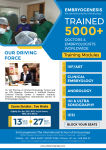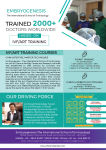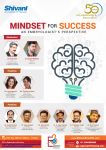
IVF NewsAnnouncement: Join special curtain-raiser 15 class "Hormonal Evaluation in Infertility"
Dr. Prof (Col) Pankaj Talwar VSM 13 August 2021
Article: IVF add-ons: are they supported by evidence?
Sarah Lensen 09 August 2021
IVF add-ons are procedures, techniques or medicines which can be used in addition to standard IVF protocols. They are usually offered by IVF clinics, and used by patients, with the hope that they will improve the chance of IVF success. Many different IVF add-ons are available, each proposed to somehow improve the fertility of the patients or the IVF process itself. Examples include: endometrial scratching (disrupting the endometrium prior to embryo transfer, hoping this might improve the chance of embryo implantation), EmbryoGlue (a special solution the embryo is dipped into before embryo transfer), and pre-implantation genetic testing for aneuploidy (screening of embryos for those with the wrong number of chromosomes). IVF add-ons may also be considered to include complementary therapies such as acupuncture and Chinese herbal medicine, and even nutritional supplements, such as vitamins or smoothies that are suggested to boost fertility. The problem is, most of these IVF add-ons probably don't work. At least, we don't have any good evidence that they do. In a recent review, of 21 different add-ons available in Australia none was supported by 'high-quality evidence' of benefit i.e., that they improve the chance of getting pregnant and having a baby from IVF; three had moderate-quality evidence and two had low-quality evidence. For the remainder, the evidence was either very low quality, conflicting, or so imprecise that it was not possible to know whether the add-on is beneficial, harmful, or has no effect. Despite a lack of good evidence, use of IVF add-ons is thought to be widespread – although there is little data on their availability and use. Most IVF registers around the world don't collect and report on IVF add-on use. We can learn a little about add-on availability from IVF clinic websites – what add-ons are offered and what they cost. Reviews of IVF clinic websites conducted by ourselves and others have shown that 80 percent of IVF clinics in the UK and Australasia offer IVF add-ons, and that these usually cost patients extra. However, this doesn't tell us whether add-ons are actually being used – just that they are available. We wanted information about the prevalence of add-on use, including those that might be accessed outside the IVF clinic. Therefore, we conducted an online survey to ask IVF patients in Australia about whether they had used add-ons. IVF is commonplace here, with Australia having one of the highest rates per capita in the world, and is mostly provided by large companies. We were predominantly interested in the prevalence and nature of IVF add-on use, the role of the clinician and patient in the decision-making, the sources of information used to support these decisions, and the importance of scientific evidence, all from the perspective of the IVF patient. Our survey targeted women who had undergone IVF in Australia in the last three years. A total of 1590 responses were received. The headline result is that IVF add-on use is the norm: 82 percent of women had used at least one add-on during their IVF treatment in the last three years. The most commonly used add-on was acupuncture, accessed by a massive 45 percent of IVF patients specifically for the purposes of helping them with IVF. Another complementary therapy, Chinese herbal medicine, was also common – reported to have been used by 26 percent of women. Women reported that usually they heard about IVF add-ons first from their treating fertility specialist, and that the specialist had been the one to raise the idea of using add-ons at their consultation. However, patients also tended to believe that the final decision to use the add-on was shared equally between themselves and their doctor. Women did not appear to suffer from particularly high levels of regret about the decision to use add-ons; however, regret was higher among those who did not conceive, or who thought their doctor had the biggest role in the decision to use add-ons. Our survey found that add-ons cost patients extra 72 percent of the time. IVF add-ons can also be expensive, costing anywhere between a few dollars and a few thousand. PGT-A, testing embryos for the wrong number of chromosomes, costs approximately AU$700 per embryo, and the Endometrial Receptivity Analysis is a new test which costs approximately AU$3000. Some add-ons were often free, such as time-lapse imaging of embryos or EmbryoGlue. This is probably because these add-ons are used routinely at some IVF centres for all patients, and the costs may be absorbed by the clinic or built into the cost of IVF. Patients reported to place high importance on scientific evidence that add-ons are effective and safe. However, we know that most add-ons are not supported by good evidence. Therefore, the fact that women view evidence as important, yet used many add-ons which are not supported by evidence, might suggest that they were not adequately informed about the evidence base before using the add-on. Initiatives are underway in many settings to help ensure patients are making informed decisions in the IVF clinic. The Human Fertilisation and Embryology Authority and the Fertility Society of Australia and New Zealand have both released guidance requesting for patients to be provided with adequate information about the benefits and risks of add-ons, and to provide written informed consent, to better ensure patients are making good decisions. [ Full Article ] News: Gene responsible for lack of sperm identified
Dr Emma Green 09 August 2021
Gene variants affecting a single gene have been identified in men who do not produce sperm, giving some insight into genetic control of sperm production. Non-obstructive azoospermia is the medical term given to a condition where no sperm are present in semen, and there is no known blockage in the ducts through which sperm are released. It is thought to affect up to ten percent of men affected by infertility, and while there a number of causes not all of them are understood. Now an international team of researchers has identified variants on a gene in four men with non-obstructive azoospermia that codes for an enzyme that helps to process a type of noncoding RNA called piRNA found only in germ cells. The findings could shed some light on how sperm are produced. In the paper, published in The New England Journal of Medicine, the authors wrote: 'Evidence from studies in mice suggests that mutations in other piRNA enzymes are likely causes of severe spermatogenic failure in men, because disruption of multiple piRNA-related proteins leads to meiotic arrest and infertility in male mice.' They argue their findings support the theory that this mechanism is behind infertility in some humans too. To investigate whether there is a genetic mechanism behind non-obstructive azoospermia, protein-coding regions of the genomes of 924 men with the condition were sequenced. Four unrelated men of Middle Eastern and Pakistani descent were found to have different mutations of the PNLDC1 gene. The researchers found that PNLDC1 mutations lowered the expression of piRNA processing proteins. piRNA are short strands of RNA, just 21 to 35 nucleotide in length that are found exclusively in germ cells and are responsible for post-meiotic regulation of gene expression. Analysis of testicular tissue showed spermatogenic arrest (in which sperm fail to develop) and errors in meiosis in men with variants of this gene, with cells not developing past an immature stage of cell development. The authors suggest that faulty piRNA processing negatively affects sperm production in adult men leading to infertility, and that other genes also involved piRNA processing could lead to azoospermia. The results of this study could help to uncover the causes of non-obstructive azoospermia, assist with diagnosis and treatment, and contribute to the development of new male contraception methods. SOURCES & REFERENCES
[ Full Article ] News: ART & Embryology training program
Chennai Fertility Center and Research Institute 03 August 2021

September 2021 training batch schedule - 13th September 2021- 27th September 2021 The International School of Embryology was established to offer training for clinicians in advanced reproductive technologies. Our skill and precision to all aspirants help them to know in-depth knowledge and experience. The members of our teaching faculty aim to bring doctors and embryologists to the highest level of knowledge about reproductive techniques and practical capability in the field. Our courses cover basics in Andrology, Embryology, ICSI, and Cryosciences (Hands-on). Limited Seats. For admission Contact 9003111598
[ Full Article ] Announcement: Global Survey-Clinical embryology practice patterns, challenges, career plans, and perspectives’
Lifeinvitro Academy 31 July 2021

We are inviting you to a unique opportunity to participate for clinical embryologists/IVF laboratory professionals. We aim to provide an opportunity for IVF lab professionals around the world to voice their opinions and concerns through a questionnaire entitled ‘Clinical embryology practice patterns, challenges, career plans, and perspectives’. The research is collaboratively done by Life in Vitro Academy; the Middle East Fertility Society Embryology SIG; the Reproductive Biology Laboratory, Department of Obstetrics & Gynecology, University of Pretoria. The questionnaire was prepared using SurveyMonkey. The project was approved by the Faculty of Health Sciences’ Research Ethics Committee, University of Pretoria (Approval number 152/2021). [ Full Article ] News: ART & Embryology training program
Chennai Fertility Center and Research Institute 28 July 2021

August 2021 training batch schedule - 02nd Aug 2021- 16th Aug 2021 The International School of Embryology was established to offer training for clinicians in advanced reproductive technologies. Our skill and precision to all aspirants help them to know in-depth knowledge and experience. The members of our teaching faculty aim to bring doctors and embryologists to the highest level of knowledge about reproductive techniques and practical capability in the field. Our courses cover basics in Andrology, Embryology, ICSI and Cryosciences (Hands-on). Limited Seats. For admission Contact 9003111598 [ Full Article ] Announcement: Course Name : Ovulation Induction, IVF, OPU-ET, Reproductive Ultrasound and QA/QC
Dr. Prof (Col) Pankaj Talwar VSM 25 July 2021
Course: Join Embryology Training Program
Dr. Sarabpreet Singh 21 July 2021

Apply through the given link below- https://forms.gle/2fDRvW3YVYJJwWPY6 Any query appreciated, please Call us: +91-9899009497 Explore more about us at www.thefertilisacademy.com **Certificate will be awarded at the end of the course. [ Full Article ] Webinar: MINDSET FOR SUCCESS - AN EMBRYOLOGIST'S PERSPECTIVE
RSK Digital 20 July 2021

In an IVF Setup, the LAB can be considered as the ENGINE, where our Embryologists accomplish the IVF procedure. In these tiring pandemic times and the quickly changing IVF Universe, our EMBRYOLOGISTS’ have many other challenges apart from scientific work. To better understand & confront these challenges we have planned a webinar on MINDSET FOR SUCCESS- an Embryologist’s Perspective. Join us on 25th July 2021 @ 10:30 am on “World Embryologist Day” Register Yourself Today For The Free Webinar https://lnkd.in/gB7BbtE #ivfevent #embryologyevent #embryology #worldEmbryologistday #Embryologistday #webinar #freewebinar #embryologistsevent #embryologists #ivf #art #doctors #ivfscience #ivfwebinar #ivfworld #ivfdoctors #ivfsupport #ivfclinics #ivfsuccess #ivftreatment [ Full Article ] News: Embryos to be destroyed after sperm donor withdraws consent
Blair Sowry 19 July 2021
An Australian sperm donor has withdrawn his consent and insisted all embryos created with his sperm be destroyed. Six families currently have embryos in storage created with the donor's sperm. Legislation in the state of Victoria, where the sperm was donated, allows donors to withdraw their consent following embryo creation. Other Australian states only allow the donor to withdraw consent for future donations, not affecting embryos that have already been created. Jess and Leroy Natoli, who have three embryos frozen using the donor's sperm and Jess's eggs told the Daily Mail Australia 'Those embryos are half genetically ours.' They described the donor's decision as 'selfish' and felt his decision and the supporting legislation was 'shameful, appalling and heartbreaking all at the same time'. Another couple, Lissa and Kariah Koehler, have a daughter conceived using the donor's sperm and Lissa's eggs. They have five frozen embryos, which they were hoping to use to give their daughter a biological sibling. Now that the stored embryos must be destroyed, the couple would have to undergo further IVF treatment to have another child. Lissa's previous treatment had a major physical and emotional impact on her and as she is now older, her chances of success would be reduced. She told ABC News, 'It's, unfortunately, a reality that a woman at 35, compared to a woman at 40 is not as fertile, so the reality for us now is that we would have to start the IVF process all over again.' Although the couple attended counselling sessions prior to creating the embryos through IVF, they did not recall the implications of a donor withdrawing his consent being mentioned to them, saying 'If it was said, it was very loosely brushed over.' A 2019 review of fertility laws in the state, commissioned by the Victorian Government had suggested legislation be brought into line with other states, where the donor can only withdraw their consent up to the point where embryos are created. The Natoli's have started a petition, calling the Victorian Government to amend the Assisted Reproductive Treatment Act to protect families in a similar situation to them. Professor Sonia Allan, from Western Sydney University School of Law, told ABC News that couples such as the Koehlers could seek compensation from clinics if they were not properly informed of the legal implications regarding sperm donation in Victoria. 'They'd be looking at potentially claiming that money back as an economic loss, they might also be entitled to compensation for the emotional aspects of what they've endured,' she said SOURCES & REFERENCES [ Full Article ] |